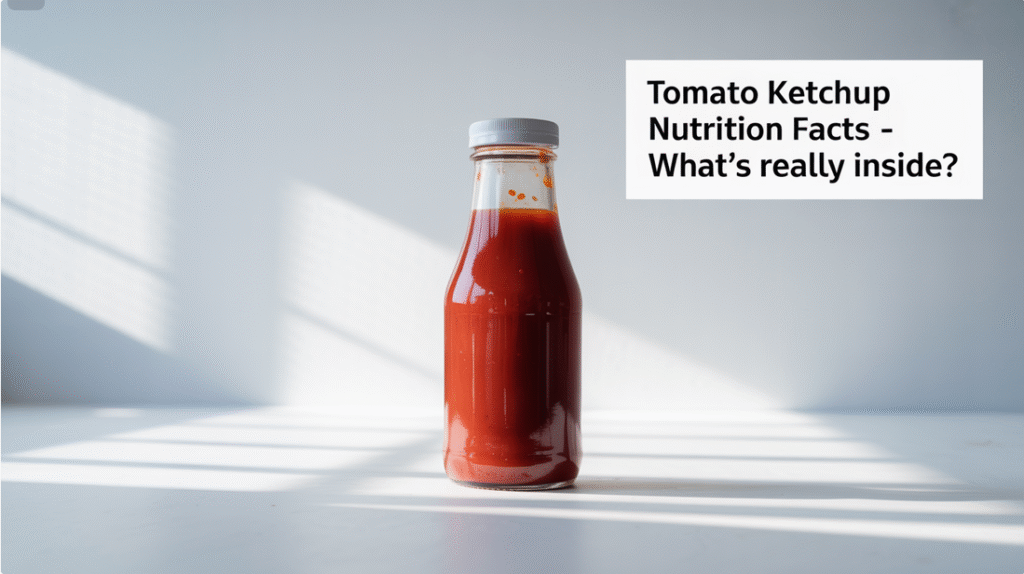Affiliate Disclosure: PantryBrands.co.uk is a participant in the Amazon.co.uk Associates Programme. As an Amazon Associate, we earn from qualifying purchases made through links on this site.
Tomato ketchup is low in fat and calories but contains added sugars and salt – making it a condiment best enjoyed in moderation. While it can enhance flavour in countless meals, understanding what’s really inside each tablespoon can help you make informed choices, especially if you’re watching your sugar or sodium intake.

Let’s take a closer look at the full nutritional profile of tomato ketchup and how it fits into a balanced diet.
What Makes Up Tomato Ketchup Nutritionally?
Despite its simplicity, tomato ketchup has a distinctive mix of nutrients influenced by its ingredients.
Key Macronutrients in Ketchup
A standard serving of ketchup is usually one tablespoon (around 15g). Here’s what that includes:
- Calories: Approximately 15–20 kcal per tablespoon
- Sugar: Around 3.5–4g of sugar (mainly added)
- Fat: Negligible – less than 0.1g
- Protein: Less than 0.2g
- Carbohydrates: Typically 4g (mostly sugars)
Sodium Content in Tomato Ketchup
Ketchup is also relatively high in sodium for such a small serving:
- Around 160–190mg per tablespoon
- That’s about 7–8% of an adult’s recommended daily intake
If you consume multiple tablespoons or add ketchup to many meals daily, your sodium intake could rise significantly.
Hidden Ingredients That Impact Nutrition
While ketchup seems like a basic sauce, several added components affect its nutritional value.
Added Sugars and Sweeteners
Most ketchup brands use high-fructose corn syrup or glucose-fructose syrup to enhance flavour.
- This contributes to the sugar spike in each serving
- Can impact blood sugar levels if consumed in large amounts
Preservatives and Acids
Ketchup includes vinegar and other acids to preserve freshness.
- These do not significantly impact nutrition
- Some sensitive individuals may notice acidity-related discomfort
Is Ketchup a Good Source of Vitamins?
Although made from tomatoes, ketchup is not a significant source of vitamins or minerals.
Does Ketchup Contain Lycopene?
Yes – ketchup contains lycopene, a powerful antioxidant found in tomatoes.
- Lycopene is linked with heart health and cancer prevention
- Cooking tomatoes (as done in ketchup) makes lycopene more bioavailable
Other Vitamins and Minerals
Only trace amounts are present:
- Small amounts of vitamin A and C
- Slight potassium levels (around 50mg per tablespoon)
However, the quantities are too low to treat ketchup as a meaningful source of nutrition.
How Ketchup Compares with Other Condiments
When choosing what to drizzle on your chips or sandwiches, it helps to know how ketchup compares with alternatives.
Ketchup vs Brown Sauce
- Ketchup is sweeter, with more added sugars
- Brown sauce typically has more complex flavours and spices
Ketchup vs Mayonnaise
- Mayonnaise is far higher in fat and calories
- Ketchup is lower in calories but higher in sugar
Ketchup vs Mustard
- Mustard is often the healthiest in terms of calorie and sugar content
- Ketchup wins on universal taste appeal
Healthier Options for Ketchup Lovers
If you love ketchup but want a healthier approach, there are alternatives worth considering.
Reduced Sugar and Salt Ketchup
Many UK brands now offer lighter versions:
- 50% less sugar and salt options are widely available
- Some use stevia or natural sweeteners
Homemade Ketchup
Making it yourself gives you control over ingredients:
- Avoid refined sugar and high sodium levels
- Add spices and herbs for a unique flavour
How Much Ketchup Is Too Much?
Moderation is key – even with low-fat foods like ketchup.
Understanding Safe Intake Levels
As a general guideline:
- Limit intake to 1–2 tablespoons per meal
- Be cautious when using it with other salty or sugary items
Too much ketchup regularly can contribute to:
- Increased sugar intake (potential risk for insulin sensitivity)
- Elevated sodium levels (risking high blood pressure)
FAQs About Tomato Ketchup Nutrition Facts
Here are some questions and answers about tomato ketchup’s nutritional value.
Is tomato ketchup healthy?
Ketchup is relatively low in fat and calories, but it’s high in added sugars and salt. It’s fine in moderation as part of a balanced diet.
Does ketchup have any vitamins?
Ketchup contains small amounts of lycopene, vitamin A, and potassium, but not enough to rely on it for nutritional benefits.
Is reduced-sugar ketchup a better option?
Yes. Reduced-sugar and salt versions lower your intake of these ingredients and are a healthier choice for frequent use.
Can I eat ketchup if I have diabetes?
You should limit ketchup intake if you have diabetes due to its high sugar content. Opt for sugar-free or low-sugar versions and read labels carefully.
Does ketchup count as one of your 5-a-day?
No, ketchup does not count towards your 5-a-day fruit and vegetable intake because of its low tomato concentration and high sugar content.
